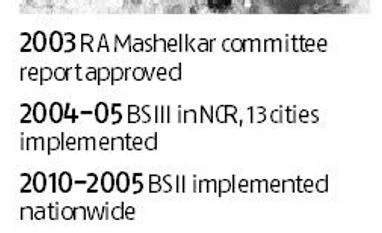“Like whiskey mixed with water, BS-VI fuel is already there in the petrol and the diesel consumed by you in Delhi”
These words by Indian Oil Corporation chairman Sanjiv Singh sum up the preparedness for the historic launch of the upgraded Bharat Stage (BS)-VI fuel in Delhi from April 1. Oil marketing companies like IOC, Bharat Petroleum Corporation (BPCL) and Hindustan Petroleum Corporation (HPCL) have already started supplying BS-VI in the Delhi market.
“Our refineries at Mathura and Panipat are ready to cater to the Delhi market. Mathura has started feeding BS-VI fuel through pipelines, and fuel from this refinery will be enough to cater to the Delhi market. Panipat is a stand-in option. From April 1, we will only be supplying the higher grade fuel in the Delhi market without passing on the impact to consumers,” Singh said.
In January, companies had started supplying BS-VI fuel to a few outlets in the capital through tanks, and by the end of February, all the outlets in the city were receiving it, which is currently being sold mixed with BS IV fuel.
“Almost all the 387 retail outlets in Delhi have started getting BS VI fuel. We do not need any additional investment for this. Some of us may not even know that have started selling a mix of BS VI and BS IV fuel,” said Ajay Bansal, president of All India Petroleum Dealers Association (AIPDA).
Sources have confirmed that majority of the tanks in nearby terminals of Tikrikalan and Bijwasan are filled with BS-VI fuel and in the next 10-15 days, the higher grade fuel may be completely on stream.
Singh said the supply of higher grade fuel may affect optimised operations of the company’s refineries.
Experts, on the other hand, say that though the upgrade may lead to better performance and fuel efficiency, comprehensive benefits could only be reaped once engines are shifted to BS-VI norms.
“We will be facing a marginal throughput loss at the refinery front as the refineries are not yet fully updated to the higher grade fuel. Through upgraded technology, we are coming up with BS-VI fuel from BS-IV refineries. Now, it is the turn of automobile manufacturers to come up with higher grade vehicles to suit such fuel as the measure may not be completely effective without them stepping in,” Singh said.
The advanced introduction of BS-VI fuel in Delhi will also give automobile firms opportunities to market-test their models before a pan-India roll-out in April 2020.
Sources said oil marketing companies (OMCs) may suffer a Rs 1 billion loss as they are not passing on it to consumers. According to the Delhi Statistical Hand Book, released by the state government recently, Delhi consumed 12,67,000 metric tonnes of diesel and 9,02,000 metric tonnes of petrol in the last financial year.
According to the specifications, BS-VI fuel limits the amount of sulphur to 10 parts per million (ppm) from 50 ppm in BS-IV. This specification is aligned to the corresponding European fuel specifications.
The company sources revealed that petrol pumps in Delhi already have around 30-40 ppm fuel supplied, and by April 1, it will be 10 ppm meeting the new norms. “From April 1, vehicles in Delhi will release less carbon monoxide (CO), hydrocarbon, nitrogen oxides (NOx), sulphur and particulate matter (PM) compared to BS IV,” said an expert.
According to estimates, BS-VI compliant diesel vehicles will reduce nitrogen oxides (NOx) emission by 68 per cent, and petrol vehicles by 25 per cent. Cancer-causing particulate matter emissions from diesel will also come down by around 80 per cent.
India had decided to skip BS-V and move directly to BS-VI in January 2016.
“The companies have not given any specific instruction to us regarding the fuel and how to manage it. I understand that refining costs may go up as they are supplying far more efficient grade of fuel. For dealers and consumers, it may not have any implication initially,” said A D Satyanarayan, President, Consortium of Indian Petroleum Dealers.
Shifting to a higher quality fuel is part of a strategy by India to reduce carbon emissions by 33-35 per cent and to increase renewable energy capacity to 40 per cent by 2030 as part of its commitment to the United Nations Framework Convention (UNFCCC) on Climate Change for a global climate pact.
Unlock 30+ premium stories daily hand-picked by our editors, across devices on browser and app.
Pick your 5 favourite companies, get a daily email with all news updates on them.
Full access to our intuitive epaper - clip, save, share articles from any device; newspaper archives from 2006.
Preferential invites to Business Standard events.
Curated newsletters on markets, personal finance, policy & politics, start-ups, technology, and more.
)